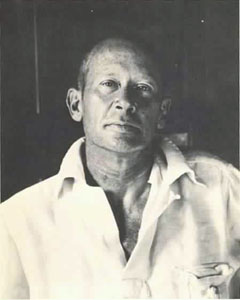This gentle, moving translation by Ezra Pound is a good example of
Imagism, a movement Pound helped put forward based on traditional Chinese and Japanese poetry. Imagism stresses clarity, precision, and economy of language.
The River Merchant's Wife: A Letter
WHILE my hair was still cut straight across my forehead
Played I about the front gate, pulling flowers.
You came by on bamboo stilts, playing horse,
You walked about my seat, playing with blue plums.
And we went on living in the village of Chokan:
Two small people, without dislike or suspicion.
At fourteen I married My Lord you,
I never laughed, being bashful.
Lowering my head, I looked at the wall.
Called to, a thousand times, I never looked back.
At fifteen I stopped scowling,
I desired my dust to be mingled with yours
Forever and forever and forever.
Why should I climb the look out?
At sixteen you departed,
You went into fat Ku-to-yen, by the river of swirling eddies,
And you have been gone five months.
The monkeys make sorrowful noises overhead.
You dragged your feet when you went out.
By the gate now, the moss is grown, the different mosses,
Too deep to clear them away!
The leaves fall early in autumn, in wind.
The paired butterflies are already yellow with August
Over the grass in the West garden;
They hurt me. I grow older.
If you are coming down through the narrows of the river Kiang,
Please let me know beforehand,
And I will come out to meet you
As far as Cho-fu-Sa.
The Chinese poet Li Po lived during the 8th Century. He wandered throughout the country during his lifetime and legend has it he composed his poems at an astonishing speed. Ezra Pound is considered the poet most responsible for defining and promoting a modernist aesthetic in poetry. In the early teens of the twentieth century, he opened a seminal exchange of work and ideas between British and American writers, and was famous for the generosity with which he advanced the work of many major contemporaries, most notably T. S. Eliot.
Ezra Pound is considered the poet most responsible for defining and promoting a modernist aesthetic in poetry. In the early teens of the twentieth century, he opened a seminal exchange of work and ideas between British and American writers, and was famous for the generosity with which he advanced the work of many major contemporaries, most notably T. S. Eliot.
 Edna St. Vincent Millay was born in Rockland, ME in 1892. Her fourth book of poetry, The Harp Weaver, earned her the Pulitzer Prize. She was openly bisexual, which sheds some light on the otherwise mysterious title here.
Edna St. Vincent Millay was born in Rockland, ME in 1892. Her fourth book of poetry, The Harp Weaver, earned her the Pulitzer Prize. She was openly bisexual, which sheds some light on the otherwise mysterious title here. Edna St. Vincent Millay was born in Rockland, ME in 1892. Her fourth book of poetry, The Harp Weaver, earned her the Pulitzer Prize. She was openly bisexual, which sheds some light on the otherwise mysterious title here.
Edna St. Vincent Millay was born in Rockland, ME in 1892. Her fourth book of poetry, The Harp Weaver, earned her the Pulitzer Prize. She was openly bisexual, which sheds some light on the otherwise mysterious title here.


 Born in Seville in 1875, Antonio Machado is considered one of the great Spanish poets. In 1939, he died of an illness he contracted while fleeing from the armies of Francisco Franco during the Spanish Civil War.
Born in Seville in 1875, Antonio Machado is considered one of the great Spanish poets. In 1939, he died of an illness he contracted while fleeing from the armies of Francisco Franco during the Spanish Civil War.

